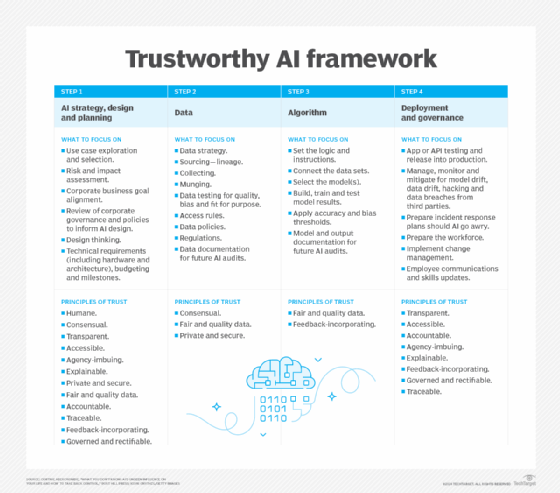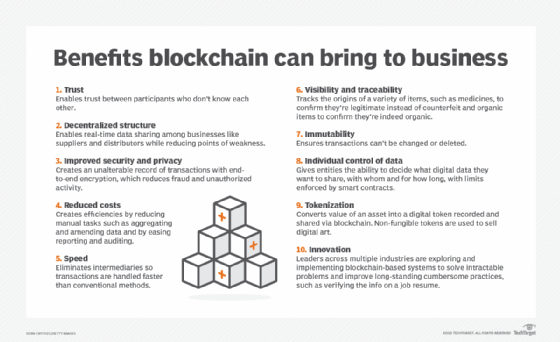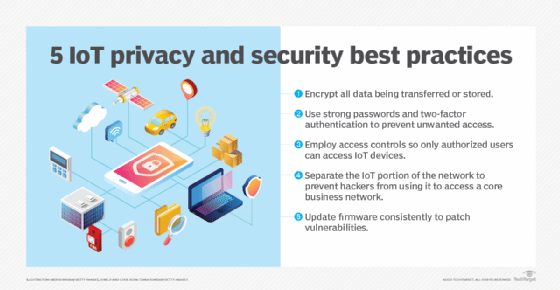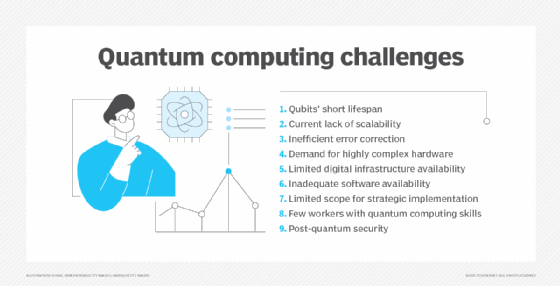What is digital trust?
Digital trust is the confidence users have in the ability of technology, processes and organizations to create and maintain a secure digital environment. It is built through strong cybersecurity, responsible data management and reliable digital interactions that consistently prioritize the user's privacy and safety.
Digital trust is an essential requirement in today's economy because it allows customers, partners and employees to confidently interact with a company's digital presence and conduct transactions. Companies that respect data privacy, provide data security and consistently deliver positive digital experiences are more likely to earn and keep user trust.
Digital trust creates a bond between a user and a company, and the more digital trust a company inspires, the more likely they are to attract and retain customers. Because consumers are interacting digitally with different businesses more often, they are putting more personally identifiable information (PII) at risk and digital trust has become a competitive differentiator.
The importance of digital trust
Digital trust is an important business asset that affects brand reputation and customer loyalty. The value that digital trust provides can strengthen business relationships and increase revenue by reducing customer churn and improving customer engagement across different marketing and sales channels.
Essentially, when customers decide to engage with a company's products or services, they are confirming their trust in the vendor. Over time, positive interactions will reinforce people's perception that a company is digitally trustworthy.
As more businesses move some (or all) of their operations online, digital trust has become as important as price, quality or convenience. It has also become a major competitive advantage because consumers, partners, and regulators are making trustworthiness a deciding factor in how they choose to engage with companies.
How does digital trust work?
Digital trust works by establishing and maintaining confidence between people and the digital technologies, systems and organizations they interact with. It can be developed by making business practices transparent and creating a strong security posture that complies with laws and regulations such as the General Data Protection Regulation (GDPR) and the California Consumer Privacy Act (CCPA).
On the back end, this requires business leaders to reevaluate their risk management procedures and incorporate security-by-design, data ethics, supply chain transparency and AI governance in their risk management frameworks and digital transformation strategies. An integrated, proactive approach to risk management can help businesses meet regulatory requirements and earn the continued trust of customers and partners by demonstrating the importance of maintaining digital trust in every aspect of their operations.
On a practical level, risk management tools can be used to identify and mitigate threats that could compromise data or system reliability and data governance tools can be used to help ensure customer information is always handled ethically and used in compliance with regulations. To demonstrate competency, companies can share trust metrics, such as the speed at which they respond to security incidents or the frequency with which their systems are tested for vulnerabilities.
In the context of information technology (IT), a trust metric is an evidence-based measurement used to assess and system performance and operational reliability. This type of metric turns the abstract idea of trust into quantifiable data that businesses can monitor and act on. For example, an organization might track data breach frequency or use large language model benchmark scores to quantify how effectively it protects data and uses generative AI ethically and responsibly.
The trust metrics in the table below illustrate how companies are transforming digital trust into a measurable, strategic business asset.
| Category |
Trust metric |
What it measures |
Why it matters |
| Cybersecurity & data protection |
Incident response time |
How quickly security threats are detected and mitigated |
Fast response reduces damage and builds confidence |
| System uptime / availability |
Reliability and service continuity |
High uptime demonstrates operational trustworthiness |
|
| Mean time to recovery (MTTR) |
Average time to restore systems after disruption |
Shows resilience and preparedness |
|
| Number of breaches or incidents |
Frequency of security failures |
Fewer incidents indicate stronger protection |
|
| Encryption coverage |
Percentage of sensitive data encrypted |
Ensures confidentiality and data integrity |
|
| Authentication success rate |
Effectiveness of access controls |
Prevents unauthorized access and misuse |
|
| Third-party risk score |
Security posture of vendors and partners |
Builds ecosystem-wide trust |
|
| Privacy & compliance |
GDPR / CCPA compliance score |
Adherence to privacy regulations |
Proves legal and ethical responsibility |
| Privacy impact assessment completion |
How often data privacy risks are reviewed |
Shows proactive privacy management |
|
| Data subject request fulfillment |
Timeliness in responding to user data requests |
Reflects accountability and user respect |
|
| Data minimization ratio |
Volume of unnecessary data collected |
Reduces privacy risk and builds user confidence |
|
| Consent management accuracy |
Correct application of user consent |
Ensures transparency and control |
|
| AI & algorithmic trust |
Model accuracy and precision |
Reliability of AI outputs |
Ensures AI systems perform as expected |
| Fairness / bias detection score |
Degree of equitable treatment across groups |
Promotes ethical and unbiased AI |
|
| Explainability index |
How understandable AI decisions are |
Builds user and regulator trust |
|
| Model drift frequency |
Rate at which AI models deviate over time |
Monitors consistency and reliability |
|
| Auditability / traceability |
Documentation of decision-making processes |
Enables accountability and compliance |
|
| LLM benchmark scores |
Large language model performance on standardized evaluation tasks |
Helps researchers and users understand how capable and trustworthy a model is in specific contexts |
|
| Organizational & ethical trust |
Digital trust maturity score |
Overall organizational trust capability |
Benchmarks trust development |
| Transparency score |
Openness about data use and technology practices |
Builds credibility with stakeholders |
|
| Accountability rating |
Responsiveness to ethical or technical issues |
Demonstrates integrity and reliability |
|
| Employee trust index |
Internal confidence in leadership and systems |
Encourages strong security culture |
|
| Customer & market trust |
Net Trust Score (NTS) |
Customer perception of trustworthiness |
Directly correlates with loyalty and advocacy |
| Customer trust index (CTI) |
Confidence that company protects data |
Strengthens relationships and retention |
|
| Churn / retention rate |
Customer loyalty over time |
Reflects sustained trust in brand |
|
| Brand trust ranking |
Public perception of corporate reliability |
Impacts reputation and market value |
|
| Transparency engagement rate |
Interaction with privacy dashboards or trust pages |
Measures active user engagement in trust practices |
How to restore digital trust
Because almost every product and service today has digital components, trust is becoming one of the most competitive advantages a company can have. Once digital trust is lost, it can be very difficult to regain. Digital trust, like personal trust, is fragile. Even one data breach, privacy violation or misleading communication can make people question an organization's integrity.
Restoring digital trust involves more than just fixing technical issues; it requires consistent effort over time and a good communication plan. If an organization's trust has been damaged by a data breach, for example, the organization needs to quickly acknowledge the breach, explain its impact and be transparent about what steps the company is taking to mitigate harm and prevent similar breaches from occurring in the future.
Demonstrated adherence to recognized digital trust frameworks can help restore digital trust. This type of framework provides a structured, verifiable way for a company to prove its long-term commitment to security, privacy and accountability.
Digital trust frameworks
A digital trust framework is a defined set of principles, best practices and assessment tools that an organization can use to establish, maintain and measure user confidence in digital technologies and organizational practices. Popular frameworks include the following:
ISACA Digital Trust Ecosystem Framework
ISACA is a global professional association that provides resources for professionals working in IT governance, cybersecurity and risk management. In 2024, ISACA published a Digital Trust Ecosystem Framework that addresses digital trust holistically. The framework is designed to help organizations build, measure and strengthen digital trust by aligning people, processes and technology with best practices for creating a digitally trustworthy ecosystem.
World Economic Forum digital trust framework
The World Economic Forum (WEF) published a digital trust framework in 2022. This framework builds on the Forum's early advocacy for digital trust and focuses on three primary goals: security and reliability; accountability and oversight; and the inclusive, ethical and responsible use of digital technology. The framework also identifies key dimensions that allow organizations to measure and evaluate the trustworthiness of their digital technologies in practical, operational terms.
New Zealand Digital Identity Services Trust Framework Act 2023
New Zealand's digital trust framework includes rules and regulations for how accredited digital identity services should protect information and privacy. This framework also includes a registry for accredited services and their providers.
U.K. Digital Identity and Attributes Trust Framework (2021)
This trust framework is designed to make accessing and using digital verification services easier, safer and more reliable. Organizations in the U.K. that want to be certified as a trustworthy digital verification service (DVS) need to use this framework because it sets national standards for identity verification and secure data sharing within digital identity systems.
Digital Trust for IoT Framework
The Online Trust Alliance (OTA) worked with the Internet Society to develop a framework that provides guidelines for securing connected devices, ensuring data integrity and maintaining consumer trust in the internet of things (IoT). This framework uses a trust-by-design approach that addresses security, privacy and lifecycle management for all stakeholders, including third-party contractors, in a holistic manner.
NIST
The United States' National Institute of Standards and Technology (NIST) does not provide a single framework for digital trust, but it does have several frameworks that can be used together to help build digital trust.
- The NIST Privacy Framework complements the organization's cybersecurity framework by providing best practices for protecting user privacy.
- The NIST AI Risk Management Framework sets out considerations unique to AI use and provides guidance on how to govern, map, manage, and measure them.
- The NIST Cybersecurity Framework 2.0 recommends best practices organizations should follow to build reliable, secure and trustworthy systems. It focuses on desired outcomes and provides links to online resources that offer additional guidance.
- NIST also offers guides for implementing a zero trust architecture. The type of architecture can improve digital trust because it uses strict access controls and requires continuous authentication and activity monitoring.
Benefits of digital trust
Digital trust offers a wide range of benefits that affect nearly every aspect of how an organization operates, interacts with customers and maintains a competitive advantage in the digital economy. When companies demonstrate that they can protect data, respect privacy and act transparently, the trust they inspire can drive measurable business value.
- According to a report on digital trust published by UserCentrics in 2025, trust is the internet's most valuable differentiator in today's competitive landscape.
- According to McKinsey research, organizations that are best positioned to build digital trust are also more likely than others to see an annual growth rates of at least 10 percent.
- According to PwC's 2025 report "The new architecture of trust," more than 90% of executives agreed that trust improves the bottom line.
Other key benefits include the following:
- Increased consumer confidence and loyalty. When customers trust that a company will protect their data and privacy, they are more likely to become loyal customers and make repeat purchases.
- Stronger brand reputation and customer engagement. Organizations that communicate transparently about data governance, continually assess risk and quickly respond to service interruptions are often perceived as being safe to engage with.
- Reduced cyber risks. According to Deloitte, there is a correlation between digital trust maturity and cybersecurity maturity levels. In a recent survey, for example, companies that had low scores for digital trust also had low scores for cybersecurity maturity.
How companies build digital trust
Companies build digital trust by consistently demonstrating that they can protect data, respect privacy and conduct business in a transparent manner. The process requires embedding trustworthiness into every layer of the business and begins by implementing strong cybersecurity measures to safeguard systems and information from unauthorized access or misuse.
Organizations can earn user confidence by clearly communicating how they use customer data and protect customer interests. Responding openly to security incidents and questions about the ethical use of technology -- especially in new areas like AI and automation -- can further strengthen trust.
How digital trust supports digital transformation
Digital transformation initiatives seek ways to use digital technology to fundamentally change how an organization operates, delivers value and responds to changing market conditions. Successful transformation hinges directly on a company's ability to earn and maintain stakeholder trust.
On a practical level, digitizing operations can help businesses reduce operational costs through automation and use data to make informed decisions and identify new revenue streams. For example, if a manufacturer adds smart sensors to its newest products, it might also be able to offer subscription-based services for predictive maintenance.
Digital trust and new technology
Digital trust can help people feel more confident about using emerging technologies. This is important because if people don't trust an emerging digital technology, adoption rates slow down, innovation stalls and the potential benefits of the technology might go unrealized.
Here are some examples of emerging technologies that deal with digital trust issues:
Digital trust in AI
Generative artificial intelligence (GenAI) is fundamentally changing the way people conduct business. Large language models (LLMs) can produce text and make decisions far faster than any human, but their internal processes are inscrutable and it's almost impossible. Fully understand how they produce the outfit they do. They are also prone to hallucinations and bias, further eroding trust in them.
As AI begins to take on jobs that were previously done by humans, people's trust in this type of digital technology is being challenged. To help improve digital trust, many companies are promoting their use of AI trust frameworks and are using a human in the loop approach to oversee, validate and refine AI decisions.

Digital trust in blockchain
Blockchains and other decentralized sources of truth are redefining how trust can be established in digital systems. Traditionally, digital trust in finance depended on a centralized authority (like a bank) to verify transactions. Blockchain changes this model by distributing verification across a network of participants who use cryptographic consensus algorithms to validate transactions. Ironically, decentralization creates what's often described as a "trustless" environment. This means that participants don't have to trust one another or a central intermediary; instead, they trust the mathematical integrity and transparency of the system itself.

Digital trust in IoT
IoT brings technology into nearly every aspect of daily life. While the connectivity an IoT network provides is convenient, it also introduces new risks that directly affect digital trust. For example, losing confidence in a smart television is inconvenient; losing trust in a home security camera, a voice assistant that listens to conversations or a medical device that helps sustain life can have serious consequences.
To build and maintain digital trust in IoT, manufacturers need to ensure IoT devices can only be accessed by authorized users, use encryption to protect data and provide timely security updates over the air. Transparent communication about how IoT data is collected, stored, shared and secured is also important.

Digital trust in quantum computing
Quantum computing is a developing field of technology that uses the principles of quantum mechanics to process information in ways that classical computers cannot. In real-world applications, quantum computing is still in its early stages. However, companies like IBM and Microsoft are developing quantum hardware and quantum platforms, while financial institutions such as JPMorgan Chase and Goldman Sachs are exploring how to use quantum computing for portfolio optimization and risk analysis.
While quantum computing holds enormous promise, it also introduces new challenges for digital trust. For example, the same quantum algorithms that enable breakthroughs in materials science, logistics and medicine could also be used to break today's encryption standards. This concern has led to the development of post-quantum cryptography (PQC) algorithms designed to remain secure against all types of cyberattacks, including quantum attacks.

The future of digital trust in business
Digital trust is evolving into a strategic business asset that can be used to strengthen customer loyalty and create a competitive advantage in an increasingly digital economy. As technologies like AI, blockchain, edge computing and quantum computing mature, it's expected that users will increasingly rely on trust metrics to decide which platforms and services they want to engage with.
While there's no single global standard for trust metrics yet, there is growing recognition that digital trust needs fewer, more meaningful indicators than are available today. Over the next few years, expect trust metrics to be combined into composite trust scores that make it easier to assess digital trust maturity levels. This will not only help make digital trust easier to measure, it will also allow companies to compare performance across industries, communicate progress to stakeholders and share data that supports a company's digital trust posture.